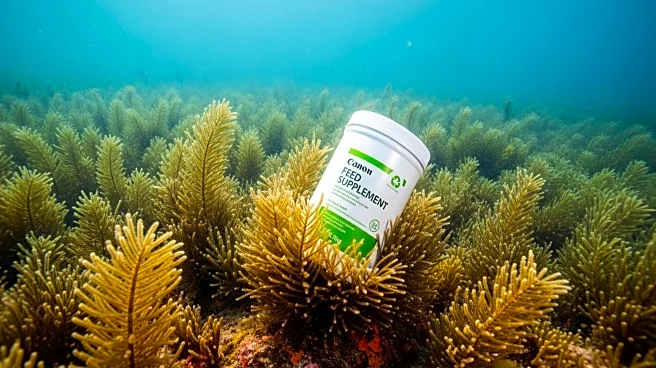What is the story about?
What's Happening?
Sea Forest, a Tasmania-based startup, has entered into a long-term partnership with Orffa, a Dutch animal health company, to distribute its methane-reducing feed supplements made from Asparagopsis seaweed. The agreement grants Orffa exclusive distribution rights for Sea Forest's SEAFEED products across the European Union, with non-exclusive rights for other countries. Sea Forest has been collaborating with research organizations and industry stakeholders to validate the safety and efficacy of its products, aiming to secure product registrations and subsidies. The company plans to initially export from Australia but intends to manufacture in the EU as demand grows. Sea Forest has developed operations in Tasmania and was the first to cultivate Asparagopsis at scale, creating cost-effective feed formulations for various livestock systems.
Why It's Important?
The partnership between Sea Forest and Orffa is significant as it addresses the growing concern over methane emissions from livestock, a potent greenhouse gas. By distributing SEAFEED products, the collaboration aims to reduce methane emissions in the EU, where compliance and emission reduction commitments are driving demand. This initiative supports farmers, brands, and retailers in meeting environmental goals, potentially leading to increased yields and carbon credits. The EU's regulatory environment and initiatives like the Global Methane Pledge further underscore the importance of such solutions in achieving emission reduction targets. The partnership could pave the way for widespread adoption of methane-reducing feed supplements, contributing to global efforts to combat climate change.
What's Next?
Sea Forest plans to expand its production capacity in the EU as market demand increases. The company is conducting large-scale trials in the EU to demonstrate productivity gains, which could influence adoption rates. As countries introduce schemes to support farmers in reducing emissions, products like SEAFEED may become integral to livestock farming practices. The partnership with Orffa, leveraging its relationships with major beef and dairy producers, is expected to facilitate market entry and drive education and support for producers. The collaboration aims to integrate methane reduction into business practices, potentially leading to policy changes and incentives for sustainable farming.
Beyond the Headlines
The partnership highlights the ethical and environmental dimensions of livestock farming, emphasizing the need for sustainable practices. It raises questions about the economic implications for farmers, processors, and consumers, as the cost of methane reduction solutions may impact pricing structures. The collaboration also reflects a shift towards integrating environmental outcomes into corporate reporting frameworks, influencing how businesses approach sustainability. As methane reduction becomes 'business as usual,' it could lead to long-term shifts in agricultural practices and consumer expectations, fostering a more sustainable food system.

















